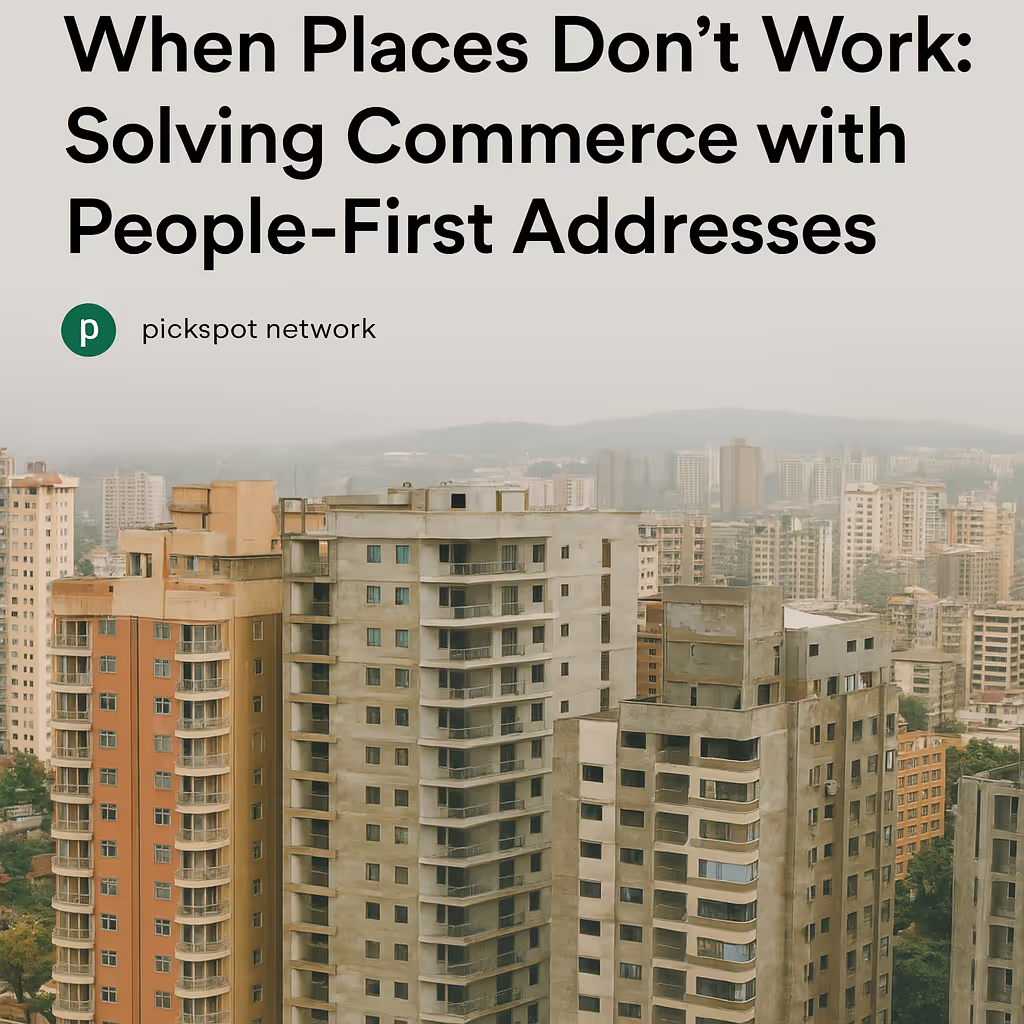
We realized the fundamental assumption was wrong when we watched 4 single-story houses in Nairobi get demolished and replaced by a 15-story building with 800 residents.How do you address that? How do...
We realized the fundamental assumption was wrong when we watched 4 single-story houses in Nairobi get demolished and replaced by a 15-story building with 800 residents.
How do you address that? How do you track 800 people sharing one physical location? How do you ensure they can participate in commerce?
Traditional addressing assumes buildings stay put. Streets get named. Numbers get assigned. Infrastructure grows methodically.
Emerging economies urbanize too fast for that playbook.
Addressing is not about numbering plots. It's not about naming streets. It's about being able to find people.
That realization changed everything. We stopped trying to map everyone to apartments and houses. We started building a people-first addressing system that lives on phones.
Consider Amina in that 15-story building. Under traditional addressing, she shares one location with 799 other people. Deliveries get lost at reception. Packages get handed to security guards. E-commerce becomes a coordination nightmare.
With digital addressing, Amina gets amina@pickspot.world. Unique. Permanent. Hers.
When she shops online, that handle routes packages to a pickspot agent nearby. She gets a pickup code. She picks up whenever convenient.
No missed deliveries. No confusion. No gatekeepers.
Emerging economies are uniquely positioned to adopt digital addressing because they have less to unlearn.
In New York or London, every building has a verified address. Every service integrates with that legacy system. Changing feels like switching from roads to rail overnight.
In Nairobi, Lagos, or Kigali, 60-80% of people don't have formal addresses. What exists often doesn't work.
No legacy equals no friction to adopt something better.
People already coordinate deliveries through WhatsApp. They send money via mobile platforms. They shop on Instagram.
The digital layer is strong. The formal infrastructure is weak.
This mirrors how M-Pesa lifted 194,000 Kenyan households out of poverty by providing financial services where traditional banking failed.
Digital addressing represents the same leapfrogging pattern. Skip the expensive physical infrastructure. Move straight to what works.
The biggest challenge isn't technical. It's trust.
In Nairobi, people say "send the package to the Victoria's shoe shop at Valley Arcade. The owner knows me." That's relationship-driven delivery using human networks.
Trust is infrastructure.
Digital addressing systems must replicate that trust while scaling beyond personal relationships.
A handle like amina@pickspot.world becomes personal and persistent. It works like a phone number or email address. That consistency builds familiarity.
Pickspot agents provide neutral, secure third parties. They don't forget, steal, or leave town. They're always available with one-time PIN access.
The system remembers when parcels arrive, when they're picked up, who dropped them. This creates audit trails that informal systems can't offer.
Instead of removing the human layer, we reshape it. Pickspot agents show up at trusted neighborhood hubs. Local vendors become custodians of the delivery network.
Trust becomes portable and scalable.
When you place a digital addressing system in an area, you open up e-commerce. People can receive and send. They can participate in digital commerce.
They become visible. They're part of the digital fabric of the world now.
This visibility transforms economic relationships. Someone in a remote area suddenly has a reliable digital address that works with any e-commerce platform globally.
Consider the implications. The informal economy represents 50% of Sub-Saharan Africa's GDP and 85% of its jobs. Most of these workers are women and youth excluded from formal financial services.
Digital addressing creates pathways for formal economic participation. A WhatsApp vendor can now scale beyond meetups and coordination calls. They can drop packages at secure pickup points linked to customer handles.
Small merchants escape the friction of handoffs. Customers get reliable delivery points regardless of their housing situation.
The economic multiplier effect is profound. Precise location data enables utility provision, service delivery, and business opportunities in previously underserved areas.
Even in rural areas, there's a central point where people gather, shop, and conduct business. Whether it's a town square, market, or transport hub.
That's where digital addressing infrastructure appears.
We don't impose new infrastructure. We plug into existing social and economic gravity.
When a PickSpot agent shows up at that central gathering point, it becomes the postal system for the entire area. Hundreds or thousands of people suddenly have access to reliable addressing.
Rural communities can participate in e-commerce for the first time. They can send products to urban markets. They can receive goods from global suppliers.
The transformation extends beyond logistics. Over 80% of consumer payments in Africa are still cash-based. Digital addressing provides the infrastructure layer needed to bring informal economies into digital commerce.
We're not building another delivery service. We're building the rails that enable delivery.
Digital handles work with any platform. The system scales with adoption rather than requiring massive upfront investment.
This approach respects the dignity of users while solving real problems. People get addresses that work in the digital economy. Merchants get reliable delivery infrastructure. Communities get connected to global commerce.
The next billion users don't need pity. They need infrastructure that works.
Digital addressing provides exactly that. A people-first system that turns the constraints of emerging economies into advantages for leapfrogging traditional infrastructure.
We address the unaddressed. Not through charity, but through better systems.